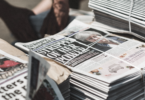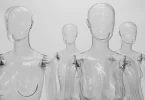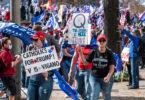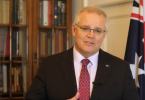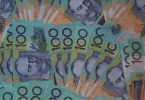Here we go again. Another Tuesday, and another attack on the ABC’s Q&A program. Aunty hasn’t had a great few months.
Last night, the ABC handed its critics another loaded gun, after it aired a tweet from a viewer with the Twitter handle @AbbottLovesAnal. The incident attracted fresh criticism from government MPs, who’ve been long mounting a campaign against the ABC’s funding.
Just a few months ago, former terrorism suspect Zaky Mallah appeared in the audience to ask a question. A storm erupted after he butted heads with a government MP while discussing changes to dual-citizenship laws.

Zaky Malla’s appearance on Q&A caused an uproar. Photo: ABC
Not one, but two inquires were launched into the program, with the government ordering its MPs boycott appearing on the panel.
While it’s true the program has made some questionable editorial decisions of late, the furore that’s erupted is a joke.
Last night’s blunder was unfortunate. And those who work on the program, like the rest of us, aren’t perfect. From time to time, mistakes are made. What’s important is that they’re acknowledged and apologies are made.
The ABC rightfully apologised to the prime minister this morning and promised the mishap would be edited out of any rebroadcasts.
But taking a step back from these mistakes, a bigger story is unfolding right before our eyes — a vehement attack on the ABC aimed at justifying further cuts to the public broadcaster.
And my issue isn’t just with Aunty’s critics. I have a bone to pick with the ABC, too.
Throughout the Zaky Mallah saga, it was clear the ABC was treading carefully. Managing director Mark Scott was restrained in his defence, promptly apologising for the incident and acknowledging an error occured. The board even gave a warning to Q&A’s executive producer Peter McEvoy.
A warning for what? A warning for not silencing a man who’d previously appeared on other television shows and was featured in an article in The Australian. That’s despite the paper leading the campaign against the ABC for featuring Mallah.
High-profile ABC journalists Leigh Sales and Sarah Ferguson have also copped a barrage of criticism of late for their hard-hitting political interviews. I’m sorry, but since when were interviews supposed to be a chance for politicians to talk spin?

An ABC-commissioned editorial review found Sarah Ferguson broke impartiality guidelines during an interview with Treasurer Joe Hockey. Photo: ABC
The ABC’s refusal to vigorously defend itself in the face of a targeted attack is, fundamentally, a sign of weakness.
A sign of an ABC that’s intimidated by the government. A sign of an ABC that’s scared of being fearless. A sign that the government’s campaign is working. And a sign that public-interest journalism is under threat.
If the ABC loses enough money, how can it continue to provide the quality journalism that it does?
As Mark Scott rightly pointed out earlier this year, the ABC is not a state broadcaster. It serves the people, not those in power. It questions and holds governments to account, not giving those in office free airtime.
To say the ABC is biased is wrong. To say the ABC is anti-Liberal is an insult. And to say that Q&A must be scrapped offends democracy.
Mark Scott and Q&A’s executive team must stand their ground. If they continue to feel threatened in the face of government attacks, it can only be a sign that Aunty is losing its guts.


